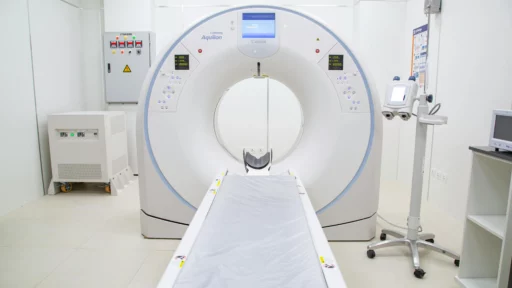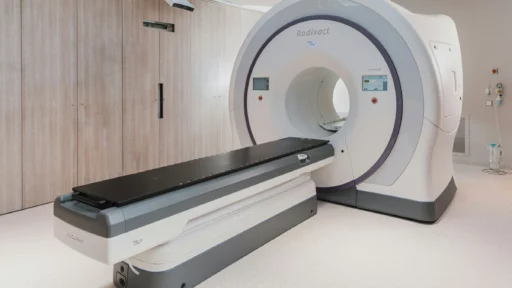Ultrasound options in Edmonton can be challenging to find. Our Good Caring research team prepared this comprehensive guide to empower you with the information to navigate your health journey — with more confidence and efficiency.
Whether you’re expecting a baby, experiencing unexplained pain, or monitoring a chronic condition, an ultrasound examination may be recommended by your healthcare provider.
Table of Contents:
- When is an ultrasound necessary?
- How to get an ultrasound in Edmonton?
- Where to find an ultrasound clinic in Edmonton?
- How long to wait for an ultrasound appointment?
- What is the cost of an ultrasound in Edmonton?
- How to prepare for an ultrasound appointment?
When is an ultrasound necessary?
Ultrasounds are commonly ordered in various situations, including:
- Pregnancy Monitoring: Ultrasounds are routinely performed during pregnancy to assess fetal development, monitor the baby’s health, and evaluate the mother’s reproductive organs. Common types include obstetric ultrasounds, Doppler scans, fetal echocardiography, transvaginal, and transabdominal ultrasounds.
- Investigating Internal Pain or Lumps: Healthcare practitioners may order an ultrasound to explore the causes of internal pain or identify the nature of lumps or cysts found anywhere in the body, such as in the breast tissue.
- Evaluating Organ Function and Abnormalities: Ultrasounds can examine the structure and function of various organs, including the liver, kidneys, gallbladder, heart, thyroid, and blood vessels, helping detect abnormalities like kidney or bladder stones, heart defects, blocked arteries, or tumors.
- Assessing Acute Injuries: Ultrasounds are valuable in evaluating the extent of acute injuries, such as tears or sprains in joints like the knee or ankle, aiding in the development of effective rehabilitation plans.
- Monitoring Chronic Conditions: For chronic conditions or injuries, ultrasounds may be ordered periodically to monitor progression or response to treatment over time.
- Guiding Medical Procedures: In certain procedures, like biopsies, ultrasound technology can provide real-time guidance, ensuring accurate placement of instruments or monitoring movements during the procedure.
How to get an ultrasound in Edmonton?
If your healthcare provider determines that an ultrasound examination is necessary to diagnose or further investigate a medical condition, they will provide you with a referral, also known as a requisition form. This form is essential for scheduling and undergoing an ultrasound at a clinic or imaging center in Edmonton.
- Requisition Form: Your healthcare practitioner will complete a requisition form, specifying the type of ultrasound required and any other relevant details, such as the specific area of concern. For example, if you require a breast ultrasound, the referring physician will indicate the precise location on a diagram.
- Appointment Scheduling: Ultrasound clinics and imaging departments at hospitals do not offer walk-in services. Therefore, you will need to make an appointment in advance. During the scheduling process, you will be required to provide your requisition form and a valid Alberta health card.
- Clinic Selection: Your primary care provider or medical office staff may be familiar with reputable imaging clinics in your area and can assist you in finding a suitable location. Alternatively, you can research and select a clinic based on factors such as convenience, availability, and specialization.
Where to find an ultrasound clinic in Edmonton?
If your healthcare provider determines that an ultrasound examination is necessary, they will provide you with a referral, also known as a requisition form. This form is essential for scheduling and undergoing an ultrasound at a clinic or imaging center in Edmonton.
Your primary care provider or medical office staff may be familiar with reputable imaging clinics in your area and can assist you in finding a suitable location. Alternatively, you can research and select a clinic based on factors such as convenience, availability, and specialization.
Imaging clinics in Edmonton that offer ultrasound services include:
How long to wait for an ultrasound appointment?
Obtaining an ultrasound appointment has become increasingly challenging in recent years due to growing demand for these diagnostic imaging services. According to recent data, the average wait time for an ultrasound appointment could be as high as five weeks. With this trend in mind, it’s essential to be prepared for potential delays when scheduling your ultrasound.
Ultrasound clinics often experience their highest volume of patients during lunchtime and before or after typical working hours (9 AM to 5 PM). If your schedule allows, consider requesting an appointment during off-peak times, such as early morning or late afternoon, as this may increase your chances of securing an earlier slot.
Given the extended wait times, it’s crucial to plan ahead and schedule your ultrasound appointment well in advance. As soon as your healthcare provider recommends an ultrasound, start researching and contacting clinics to secure the earliest available slot that aligns with your schedule.
To maximize your chances of obtaining a timely appointment, it’s advisable to contact several ultrasound clinics in your area. Wait times can vary significantly between facilities, and by exploring multiple options, you may find a clinic that can accommodate your needs sooner.
What is the cost of an ultrasound in Edmonton?
In Edmonton, the cost of ultrasound imaging is largely covered by the Alberta Health Care Insurance Plan (AHCIP), provided that you meet certain eligibility criteria, such as presenting a valid Alberta Health Care card and a requisition form from your healthcare provider at the time of your appointment.
Under AHCIP, the following ultrasound services are typically covered:
- 2D (two-dimensional) ultrasounds
- Diagnostic ultrasounds for various body parts and organs
- Prenatal ultrasounds during pregnancy
However, certain types of ultrasounds, such as 3D (three-dimensional) and 4D (four-dimensional) ultrasounds, are considered elective and are not covered by AHCIP. These ultrasounds are often sought by expectant parents during pregnancy for a more detailed visualization of the fetus.
The cost of elective ultrasounds in Edmonton can vary significantly, typically ranging from $100 to $300 for a 3D ultrasound. Some clinics may offer packages or multiple visit options at higher prices.
How to Prepare for an Ultrasound Appointment
Before the Appointment
To ensure accurate and effective imaging, some preparation is required before your ultrasound appointment. The specific steps may vary depending on the type of ultrasound you are scheduled for:
- Dietary Restrictions: Some ultrasounds, such as abdominal or pelvic examinations, may require you to have an empty stomach or a full bladder. Be sure to clarify any dietary restrictions or fluid intake requirements with the clinic beforehand.
- Bowel Preparation: In the case of rectal ultrasounds, you may be instructed to undergo an enema or follow specific bowel preparation instructions to ensure your bowels are empty for the procedure.
- Requisition Form: Don’t forget to bring your requisition form, which communicates the type of examination required and streamlines the check-in process.
- Comfortable Clothing: Many ultrasound examinations require you to remove certain clothing items to allow access to the area being imaged. Wear loose and comfortable clothing that can be easily removed and put back on.
During the Appointment
During your ultrasound appointment, feel free to ask questions or clarify any concerns you may have about the procedure, duration, or the ability to have a support person present. Additionally, inquire about the clinic’s policies regarding taking your own photos or videos, especially if it’s a prenatal ultrasound.
After the Appointment
After your ultrasound examination, the imaging clinic will send your images and requisition form to a radiologist for review and interpretation. The radiologist will provide a detailed written report outlining the specific findings of the imaging.
This report, along with the images, will be sent to your referring healthcare provider, who will discuss the results with you during a follow-up appointment. It’s crucial to schedule this follow-up appointment to receive a comprehensive explanation of the ultrasound findings and any necessary next steps or treatment recommendations.
The time it takes to receive your ultrasound results can vary depending on several factors, including urgency, complexity, the need for additional information or imaging, comparison with previous scans, and the mode of transmission used by the clinic. On average, it can take up to a week to receive your results, but this timeframe can be shorter or longer depending on your specific case.










